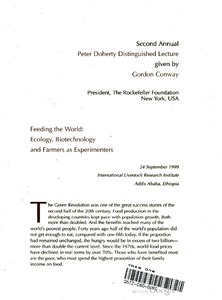Land, trees, and women
This research report examines three questions that are central to IFPRI research: How do property-rights institutions affect efficiency and equity? How are resources allocated within households? Why does this matter from a policy perspective? As part of a larger multicountry study on property rights to land and trees, this study focuses on the evolution from customary land tenure with communal ownership toward individualized rights, and how this shift affects women and men differently.This study’s key contribution is its multilevel econometric analysis of efficiency and equity issues.
Farm-level benefits to investments for mitigating land degradation: empirical evidence from Ethiopia
Changing Farmers' Land Management Practices in the Hills of Nepal
This paper sheds light on changing farmers' land management practices in two mountain watersheds, with and without external assistance, in the western hills of Nepal. Information used in the analysis were obtained through a survey of 300 households, group discussion, key informant interviews, and field observation conducted during April–September 1999.
Using farmers' knowledge for defining criteria for land qualities in biophysical land evaluation
The objective of this paper is to present a way of complementing empirical results with farmers' perceptions in defining limiting biophysical land properties in a land suitability evaluation using the FAO framework methodology. The farmers' perceptions were identified using rapid and participatory rural appraisal (RRA/PRA) tools. The study catchment, having a semiarid continental climate and located on the Loess Plateau in northern China, covered an area of 3.5 km2. Most of the land users were dependent on subsistence agriculture.
Impacts of land redistribution on land management and productivity in the Ethiopian highlands
The increasing problem of landlessness in Ethiopia has put pressure on regional governments to redistribute land. In 1997 and 1998, a major land redistribution was undertaken in the Amhara Region, reducing landlessness where implemented. While the impacts of such redistributions have been hotly debated, little empirical evidence exists concerning the actual impacts of redistribution.
An overview of development processes and farmers' interactions in a participatory forest fire prevention programme in Jambi province, Indonesia
The participatory forest fire prevention programme of Forest Fire Prevention Management Project (FFPMP) aims at intensive fuel management and fire control with the integrated green belt on community land on the boundary of Berbak National Park, Jambi Province, Sumatra. It aims to motivate farmers to cultivate their land continuously, reducing fire hazards and risks through formation of fuel breaks around the forest. Participating farmers face technical limitations in seedling production, land preparation without burning, and crop planting and protection.
From plot to watershed management: Experience in farmer participatory Vertisol technology generation and adoption in highland Ethiopia
This chapter summarises the experience of a research project for developing and disseminating technologies for better management of Vertisols for improving productivity.
Land reform and the development of commercial agriculture in Vietnam: policy and issues
Over the last decade, following the doi moi reforms, the Vietnamese government has formally recognised the household as the basic unit of production and allocated land use rights to households. Under the 1993 Land Law these rights can be transferred, exchanged, leased, inherited, and mortgaged. A land market is emerging in Vietnam but is still constrained for various reasons. Additionally, lack of flexibility of land use is an issue.
Agrarisch ondernemerschap in de groene ruimte 2015/2020; een inventarisatie van maatschappelijke behoeften en mogelijkheden voor agrariërs
Er is informatie geonventariseerd over maatschappelijke behoeften die in 2015-2020 waarschijnlijk spelen ten aanzien van de groene ruimte en over beheersystemen waarmee agrariërs kunnen inspelen op deze behoeften. Speciale aandacht is uitgegaan naar het effect van de beheersystemen op inkomens van agrariërs en naar de betekenis van de beheersystemen voor drie ruimtelijke kwaliteitsaspecten te weten economisch, sociaal en ecologisch. In totaal zijn twintig beheersystemen gesignaleerd. Zestien daarvan kunnen positief uitpakken voor het inkomen van agrariërs.








